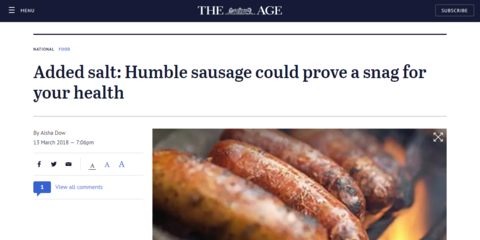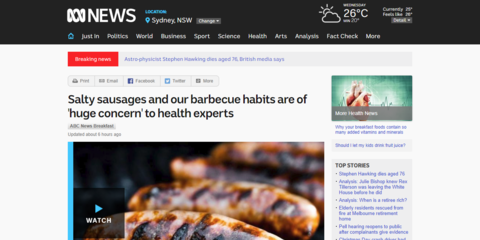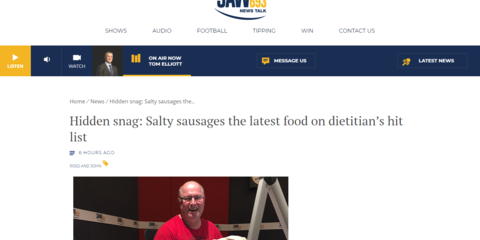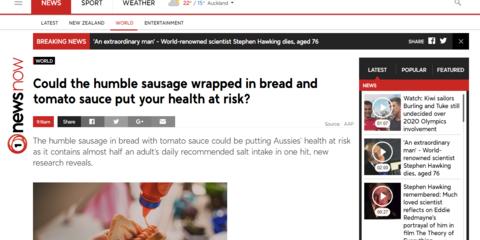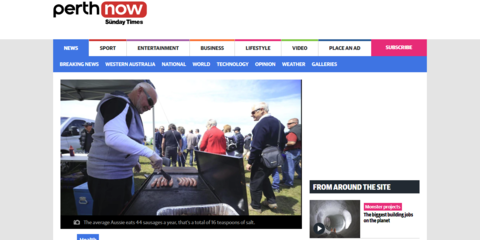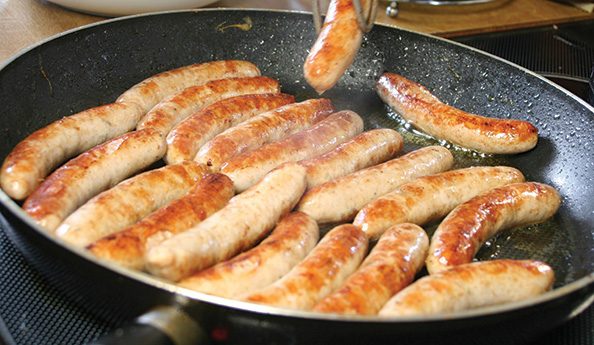
Aussie BBQ classic proving a snag to good health
- Read the report 'Changes in the salt levels in processed meat 2010-2017' (PDF 963KB)
- See the top five highest and lowest salt sausages (PDF 357KB)
A sausage in bread could be considered Australia’s national dish. But with Australians wolfing down 1.1 billion snags a year, containing 1500 tonnes of salt, it’s putting our health at risk.
New research from The George Institute for Global Health, VicHealth and the Heart Foundation has revealed the humble snag in white bread and tomato sauce contains a whopping 2.35 grams of salt – nearly half of the recommended daily salt intake.
The report, released as part of World Salt Awareness Week, analysed the salt content in more than 1000 of Australians’ favourite processed meats like sausages, ham and bacon from Australia’s four major supermarkets from 2010 to 2017.
It found on average one sausage contains more than one-quarter (28%) of your recommended maximum daily salt intake. While other salty offenders, such as bacon and sliced meats, had reduced their salt content over the years, there has been no change to the salt content in sausages.
Heart Foundation Victoria Dietitian Sian Armstrong said the drop in salt in bacon and sliced meat products proved manufacturers can make their meats less salty.
“It’s a massive concern that in almost a decade there’s been no change to the salt levels in sausages. The average Aussie eats 44 sausages a year totalling 16 teaspoons of salt,” Ms Armstrong said.
“And some sausages are three times saltier than others. We need targets to drive manufacturers to make their sausages less salty and improve the health of the population.
“Excess salt is directly linked to high blood pressure, which increases the risk of heart attack, kidney disease and stroke,” she said. “One of the best ways to keep your blood pressure down is by eating less salt.”
Key findings:
On average, one sausage contains more than one-quarter (28%) of your recommended maximum daily salt intake
Just two Coles thin pork BBQ sausages, the highest salt sausages, equates to 80% of your entire day's recommended maximum daily salt intake.
There was a significant difference in the amount of salt in sausages. The saltiest snag, Coles Thin Pork BBQ Sausages (2.9g of salt per 100g) had around three times more salt than Cleaver Organic Beef Sausages – the lowest salt sausage (0.95g of salt per 100g).
While there was a 17% reduction in the salt content of bacon from 2010-2017 and an 18% reduction in the salt reduction of sliced meats from 2010-2015 there was no reduction in the salt content of sausages.
In 2017, 63% of bacon products and 70% of sliced ham products met the Food and Health Dialogue target of less than 2.7g of salt/100g. When targets are set they work. No Food and Health Dialogue target was set for sausages.
The George Institute’s Public Health Nutritionist and the report’s lead author Clare Farrand said the findings were worrying considering how popular sausages are for many families.
“Some sausages contained 2g of salt per serving – eat two sausages, and that’s almost an entire days’ worth of salt (80%), before you’ve added any sauce or bread – in a single meal,” Ms Farrand said.
“We know that setting salt targets and regular monitoring of the food industry towards achieving the targets works. Currently there are no salt targets for sausages – which is of huge concern, given how much salt they contain, and their popularity. We hope the Healthy Food Partnership, addresses this gap, and sets targets for sausages in view of these results,” she said.
VicHealth CEO Jerril Rechter said with most of us consuming almost double the recommended amount of salt per day we needed to re-think what we put on the barbie.
“Australians love our snags on the BBQ but I think most people would be surprised to learn just how much salt is in these sausages,” Ms Rechter said.
“We understand that sausages can be a quick BBQ option, but next time why not try filling the hot plate with other healthier options like chicken or veggie skewers. Vegetables like mushrooms, onions, corn on the cob and eggplant work well too, and try to make sure you serve up some tasty salads to have on the side.
“Ultimately it shouldn’t be left totally up to the consumer to make healthy choices. We want to see manufacturers committing to reformulating their processed meats to have less salt – it can be done.”
You can find loads of great recipes for your next BBQ at unpackthesalt.com.au. The site was launched by VicHealth and the Heart Foundation to raise awareness about the high levels of salt in processed and packaged foods.
Tips for consumers:
- Try lean meats such as chicken breast and steak on the BBQ instead of sausages – these have much less salt. Try chicken, beef or lamb skewers and add veggies for a healthier and lower salt alternative to sausages.
- Fill the BBQ with vegetables like corn on the cob, eggplant, mushrooms, capsicum and onion. You can make these into skewers to make them easier and more fun to eat for the kids.
- The best way to reduce salt is to eat more fresh foods and reduce your reliance on processed and packaged foods
- Sodium is one component of salt – it is the sodium that is labelled on nutrition information panels on packaged foods



